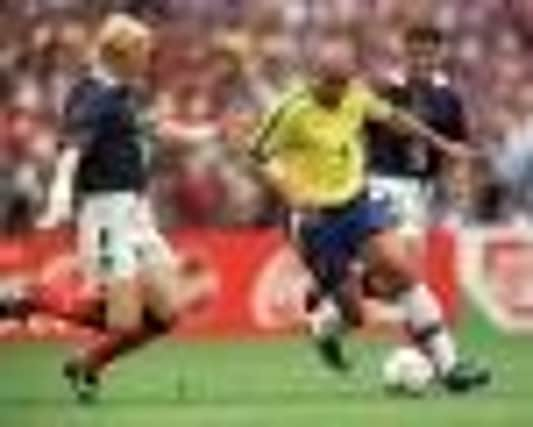Ronaldo plan is Craig Brown’s ploy to stop Leigh Griffiths


While the Dons go into tomorrow’s match at Pittodrie having already beaten Pat Fenlon’s side home and away this season, former Scotland manager Brown sees 15-goal Griffiths as posing the greatest threat to their hopes of a third victory, which would lift his team above Hibs in the SPL. To that end, Brown is ready to turn back the clock to the day Scotland opened France ’98 in Paris by facing the then world champions, aiming to stifle the supply to the on-loan Wolves hitman in the same way the Scots choked the South Americans’ service to Ronaldo.
Recalling that heady occasion in the Stade de France, Brown said: “Stopping Ronaldo was probably the hardest task I was given as Scotland manager. He was the best player in the world at the time and everyone was predicting he would destroy us in that opening game in France.
Advertisement
Hide AdAdvertisement
Hide Ad“I decided to contact Bobby Robson for advice as Ronaldo had played for him when he was manager of Barcelona.
“Before then, I tended to get someone to man-mark the opposing team’s best player, but Bobby advised me that wouldn’t work with Ronaldo because of his movement up front. He said the only way to stop Ronaldo is to find out who in the Brazilian team gives him the ball the most and stop him. We studied footage of Brazil playing and discovered 70 per cent of the passes to Ronaldo came from their full-back Cafu.
“It meant strikers Kevin Gallacher and Darren Jackson and the midfielders had the extra duty of making sure he wasn’t free to get the ball as much as he was used to. It starved the supply to Ronaldo, who did very little.”
While Brown’s plan worked to that extent, the Scots ultimately lost 2-1, with an own goal from Tom Boyd gifting Brazil victory after John Collins’ penalty had cancelled out Cesar Sampaio’s opener. That outcome in Paris, however, hasn’t dulled Brown’s view of the strategy and the 72-year-old admitted he will be looking for a similar team effort to keep Griffiths in check.
He said: “Griffiths gets a lot of supply from the Hibs full-backs as well, so we are facing a similar situation. It’s an occasion when it is going to be all about defending as a unit as opposed to expecting one of the back men to handle him.
“The front men are going to have to make sure their full-backs don’t get room to work. Our midfield will also have to put in a shift to stop passes getting through to Griffiths. If they do that then he will be less of a threat and our chances of winning will be much greater.”
Today, though, Griffiths’ strike partner Eoin Doyle insisted he and his team-mates will be heading for Pittodrie seeking a measure of redress for November’s 1-0 defeat by the Dons in the Capital, a result which ended Hibs’ unbeaten home record but one which everyone at Easter Road felt was undeserved.
Throughout the 90 minutes Griffiths conducted a virtual one-man assault on Jamie Langfield’s goal, only to find the goalkeeper at the top of his game. Doyle said: “We didn’t feel we deserved to lose, we just couldn’t get the goal. We had a lot of chances, but didn’t take them, while their goalkeeper was great.
Advertisement
Hide AdAdvertisement
Hide Ad“They scored late on [through Niall McGinn] and that killed us. I am sure if we put in a performance like that tomorrow, we’ll come away with a result.”
Although he’s lived very much in the shadow of Griffiths, Irishman Doyle has chipped in with eight goals so far this season – a total he admitted he feels could be higher, revealing that he’s his own greatest critic when it comes to analysing chances missed.
Asked to assess his own form, the former Sligo Rovers striker said: “I wish I had more goals and probably I should have had more, although I am happy enough, I suppose. I give everything I can every week, I can’t ask any more of myself in that regard, and I’ll be giving everything for a good result again tomorrow.
“You always feel you could have scored more. If you miss a chance or a half-chance, then it is always playing at the back of your mind for a couple of days afterwards, especially if they could have determined the result.
“It’s something I have to work on, not to beat myself up so much, but if I didn’t care I wouldn’t be thinking like that, so I look on it as a positive.”